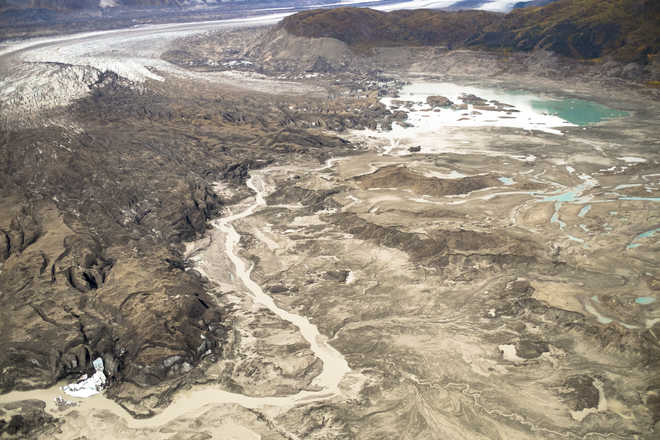
A September 2, 2016 aerial photo shows the meltwater stream along the toe of Kaskawulsh Glacier, seen on the left, that is diverting fresh water from one river to the other. — Dan Shugar/University of Washington Tacoma
Ottawa, April 19
The retreat of one of Canada's largest glaciers has changed the flow of a northern river almost overnight in an extreme case of what researchers call climate change "river piracy”.
The discovery of the Slims river diversion away from the Bering Sea into another watershed that empties into the Pacific Ocean was published in the journal Nature Geoscience.
(Follow The Tribune on Facebook; and Twitter @thetribunechd)
Gerard Roe, co-author of the study and a professor at the University of Washington in Seattle in the US state of Washington, told AFP that the Slims riverbed had dried up in only four days.
“The habitat was altered,” he said in a telephone interview. "The chemistry and biology of the water changed dramatically."
Researchers led by Canadian geomorphologist Daniel Shugar of the University of Washington in Tacoma had travelled to Canada's northern Yukon Territory last August to study the river's currents, but it was gone.
They traced its mysterious disappearance to the Slims river's headwaters, where they found a glacial barrier that once routed its flow northward into the Bering Sea had been breached in the spring.
This "abruptly and radically" altered drainage from the Kaskawulsh Glacier spring melt, according to the study, sent the river in the opposite direction into the Pacific Ocean, 1,300 km away from where the mouth of the river used to be.
Shugar and his team used computer models to show the fast glacier melt -- and the subsequent river diversion -- was due to global climate change, and not natural temperature fluctuations over centuries.
Such changes, they warned in the study, can have "profound downstream impacts" on ecosystems and communities that rely on the discharge.
Last summer, for example, Kluane Lake, which was fed by the Slims river, dropped a full metre below its lowest recorded level for that time of year.
Another research team member, John Clague of Simon Fraser University in Vancouver, said the discovery highlights that while people view climate change as a gradual process, its effects may not be.
"To me, it's kind of a metaphor for what can happen with sudden change induced by climate," he told the daily Globe and Mail. — AFP



























